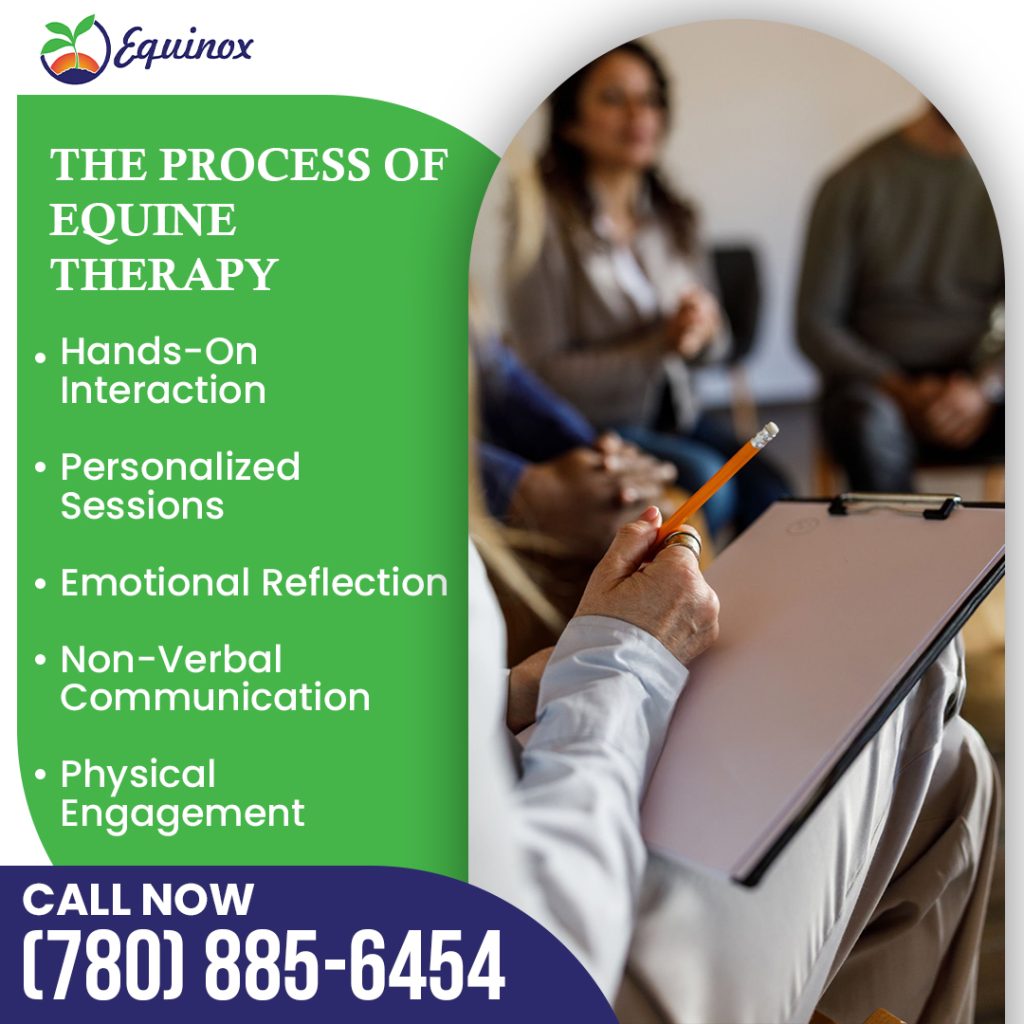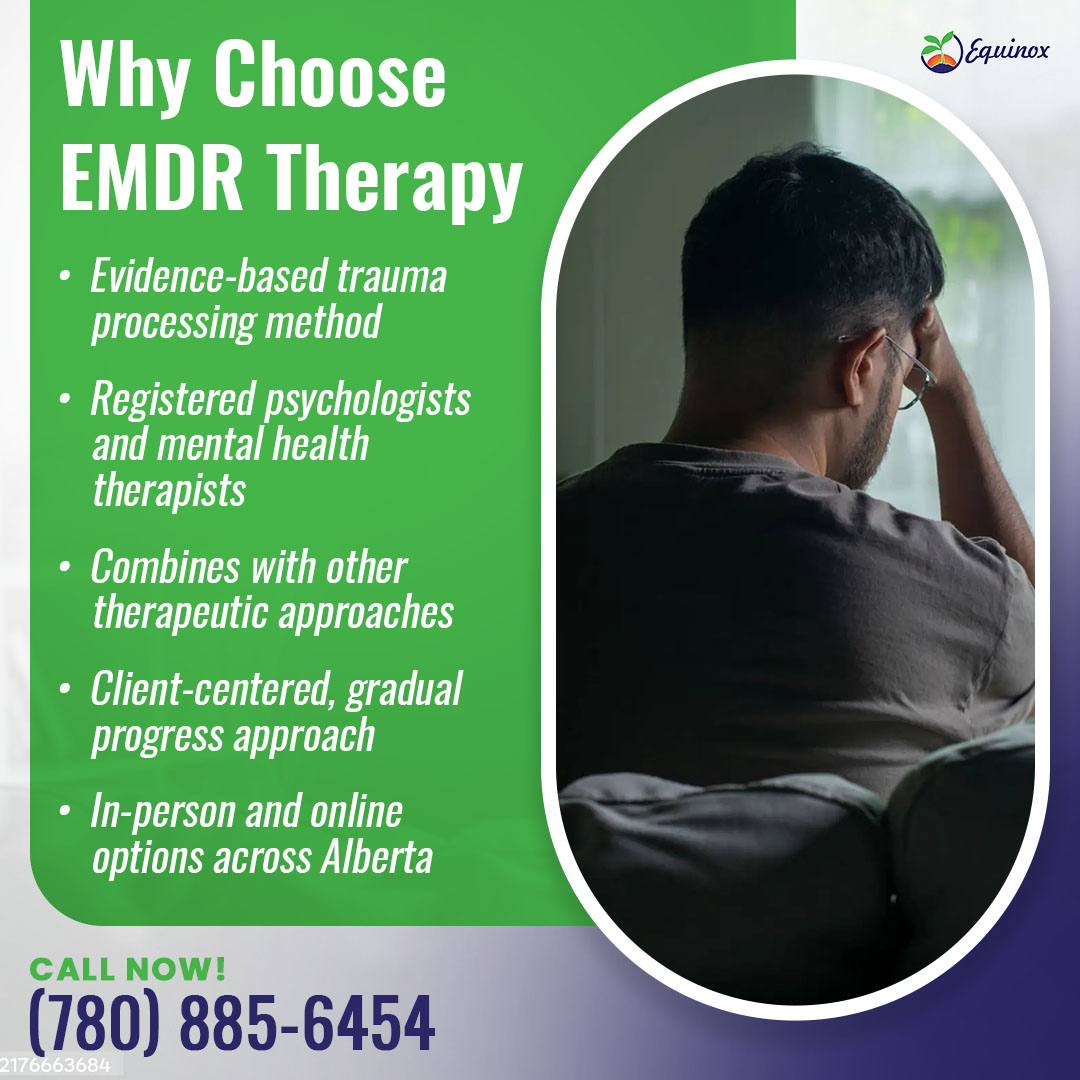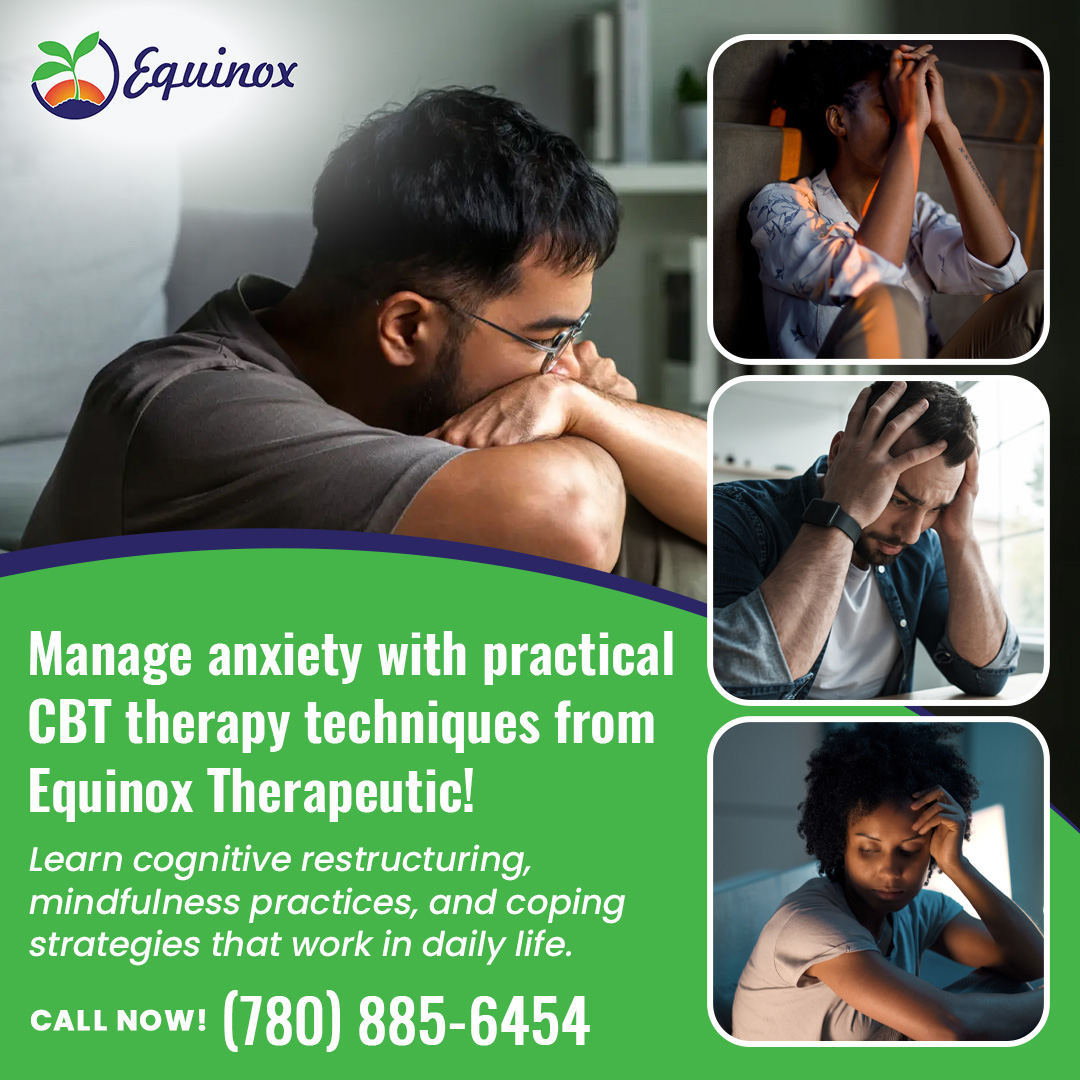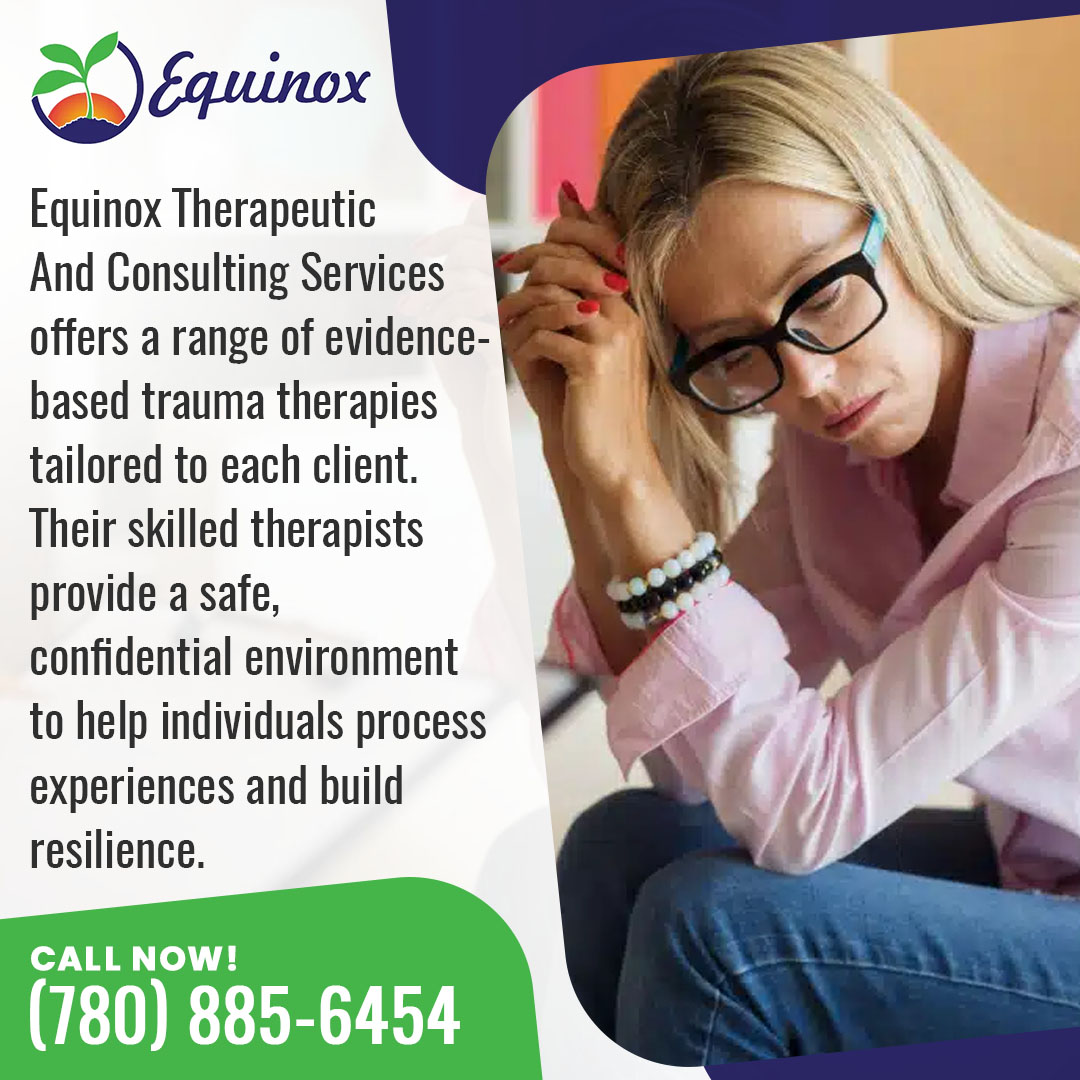Key Takeaways:
- Equine Therapy offers a unique, effective approach to trauma recovery.
- Interacting with horses helps clients build emotional awareness, trust, and resilience.
- At Equinox Therapeutic And Consulting Services, we provide expert-guided equine therapy in Edmonton.
- Equine therapy supports personal growth and healing in ways that differ from traditional office-based therapy.
Therapeutic equine therapy has become a powerful tool in the treatment of trauma and emotional difficulties. At Equinox Therapeutic And Consulting Services, we offer equine-assisted mental health (EAMH) therapy, providing clients with a unique path to healing by incorporating horses into the therapeutic process. In this blog, we explore the benefits of equine therapy and how it can support trauma recovery.
Equine therapy, also known as therapeutic equine therapy, involves guided interactions between a client, a therapist, and a horse, which aim to address emotional and psychological issues. It is an experiential form of therapy where the relationship between the client and the horse helps address emotional and psychological issues. At Equinox Therapeutic And Consulting Services, we offer equine therapy services in Edmonton that focus on developing trust, emotional awareness, and problem-solving skills.
The Link Between Trauma and Equine Therapy
Trauma can have a profound and lasting impact on mental health, disrupting one’s ability to trust, connect, and emotionally heal. While traditional trauma therapy provides valuable tools for recovery, equine therapy offers an experiential approach that helps clients process trauma uniquely and effectively. At Equinox Therapeutic And Consulting Services, we combine therapeutic expertise with equine-assisted therapy to support our clients on their healing journeys.
Through interaction with horses and the guidance of an Edmonton therapist, individuals can rebuild emotional resilience, address deep-seated trauma, and develop healthier coping mechanisms. As research on therapeutic equine therapy continues to grow, more and more clients are finding this innovative approach beneficial for trauma recovery.

Why Trauma Therapy is Essential
When someone experiences trauma, it disrupts their emotional balance, leaving them struggling with trust, self-worth, and a sense of safety. Trauma therapy aims to address these challenges by helping individuals process their experiences and emotions in a safe and supportive environment. While traditional therapy methods are highly effective, equine-assisted therapy can accelerate healing. Horses, being naturally intuitive and non-judgmental, allow clients to engage emotionally without the pressure of verbal communication. This method creates a different kind of therapeutic relationship—one where clients can face their trauma without fear of judgment or misunderstanding.
Studies, such as those by Naste et al. (2018) and Staudt and Cherry, suggest that equine-assisted therapies like Equine Facilitated Therapy for Complex Trauma (EFT-CT) hold promise in addressing complex trauma cases. At Equinox Therapeutic And Consulting Services, our Edmonton therapists use equine therapy to complement traditional methods, giving clients more ways to process and overcome their trauma. By engaging in this holistic approach, individuals can reclaim their sense of safety, trust, and emotional well-being.
How Equine Therapy Helps Process Trauma
Equine therapy provides a hands-on approach to trauma recovery, fostering emotional growth and healing in ways that talk therapy may not always reach. Clients participate in activities like grooming, leading, and feeding horses under the supervision of a trained therapist in Edmonton. These interactions are more than simple tasks; they encourage individuals to confront their emotions in a controlled, supportive environment. Horses are highly sensitive to human emotions, often mirroring the client’s internal state. This responsiveness enables clients to see their emotions reflected in them, which can lead to deeper emotional insight and healing.
As highlighted by the study conducted by Naste et al. (2018), therapeutic equine therapy can help individuals with trauma regulate emotions, rebuild trust, and establish a sense of safety. The non-verbal communication between the horse and the client encourages emotional processing, often leading to breakthroughs that might take longer in a traditional setting. By working alongside our Edmonton therapists, clients can use these experiences to develop coping mechanisms, build emotional resilience, and work through their trauma at a comfortable pace.
At Equinox Therapeutic And Consulting Services, we understand that each trauma experience is unique and equine-assisted therapy offers a flexible, individualized approach to help clients move forward in their healing journey.
Key Benefits of Equine-Assisted Therapy
Equine-assisted therapy offers unique emotional and psychological benefits for individuals recovering from trauma. At Equinox Therapeutic And Consulting Services, we’ve seen firsthand how interacting with horses fosters personal growth, emotional healing, and improved mental health. Whether it’s through building trust or developing mindfulness, equine therapy offers a transformative approach to trauma recovery.
Emotional Awareness and Trust Building
- Mirroring Emotions: Horses are incredibly intuitive creatures that naturally mirror the emotions of those around them. When a client feels anxious or unsettled, a horse may respond in a way that reflects those feelings. This mirroring allows clients to become more aware of their emotional state, helping them identify emotions they may not have fully recognized. By observing the horse’s reactions, clients are guided to reflect on their emotional responses and begin the process of healing.
- Encouraging Emotional Expression: For trauma survivors, verbalizing emotions can often feel overwhelming or impossible. Horses offer a non-verbal, emotionally intuitive way to engage with these difficult feelings. By interacting with the horse—whether through grooming, leading, or simply being present—clients can process emotions in a safe and calming environment. This non-verbal communication provides an alternative outlet for those who may struggle to express their emotions through words.
- Promoting Self-Awareness: Equine therapy fosters self-awareness by encouraging clients to tune into both the horse’s behaviour and their internal feelings. The bond formed with the horse becomes a mirror for clients to assess their emotional needs and responses. As clients engage with the horse, they are encouraged to be more mindful of how their feelings impact the interaction, promoting deeper personal insight. This process helps clients build greater self-awareness and emotional intelligence over time.
- Building Trust: Horses, due to their size and strength, require a level of trust that can be deeply transformative for trauma survivors. Trusting a horse requires clients to overcome fears and anxieties, and in doing so, they also begin to develop trust in themselves. Learning to communicate and bond with the horse can restore the client’s ability to trust others, which is often damaged by trauma. This trust-building experience can be a profound part of the healing process.
- Translating Trust to Daily Life: The trust that clients establish with horses during therapy sessions extends beyond the barn. By learning to trust the horse, clients build the confidence to trust others in their daily lives, whether it’s in personal relationships or social interactions. This skill is particularly valuable for trauma survivors who may have difficulty forming healthy, trusting relationships after their experiences. The confidence gained from building trust with a horse can empower them to rebuild trust with people.
- Non-Judgmental Space: Horses offer a non-judgmental, emotionally neutral space where clients can safely explore their vulnerabilities. Unlike human interactions, horses don’t judge or criticize, allowing clients to express emotions freely without fear of judgment. This creates a safe and open environment for clients to face their emotional struggles without feeling pressured. As a result, they can work through complex emotions in a calm and accepting atmosphere.
- Strengthening Relationships: The trust and communication skills developed in equine therapy are transferable to the client’s relationships outside of therapy. As clients learn to trust, communicate, and set boundaries with horses, they gain valuable insights into how to apply these skills in their personal lives. This can lead to stronger, healthier relationships with family, friends, and partners. Equine therapy equips clients with the tools to build meaningful, trusting connections with others.
- Stress Reduction and Mindfulness: Equine therapy promotes stress reduction by helping clients focus on the present moment. Grooming and caring for a horse encourages mindfulness, allowing individuals to calm their racing thoughts and connect with the present. For those recovering from trauma, this can be a powerful way to manage anxiety and stress.
- Developing Healthy Boundaries: Horses require clear boundaries for effective interaction. Through equine therapy, clients learn to set and maintain healthy boundaries, which is an essential skill in both personal relationships and trauma recovery.
Equine Therapy vs. Traditional Therapy: What’s the Difference?
Traditional therapy typically involves sitting in an office setting, relying heavily on verbal communication between the therapist and the client. Equine therapy, however, offers a more interactive and hands-on experience by incorporating horses into the healing process. This approach allows clients to engage both physically and emotionally, offering unique opportunities for growth that may not be possible in a traditional setting. For many, the non-verbal, experiential nature of equine therapy creates a more effective path toward emotional breakthroughs.
A Hands-On Therapeutic Experience
Equine therapy provides a highly interactive and engaging experience, unlike traditional therapy, which typically revolves around talking in an office. Clients actively participate in activities like grooming, leading, and caring for the horse, creating a dynamic and immersive therapeutic environment. This hands-on approach is especially beneficial for individuals who may struggle with verbalizing their emotions or feel stuck in conventional therapy settings. By physically interacting with the horse, clients can process feelings and emotions in a new, non-verbal way, which can be incredibly healing. The physical involvement in equine therapy offers an opportunity for clients to connect with their emotions through action rather than words, which can promote deeper emotional healing.
Who Can Benefit from Equine Therapy?
- Trauma Survivors: Equine therapy is particularly effective for individuals recovering from trauma, helping them build trust and emotional resilience.
- Children and Adolescents: Kids and teens, especially those struggling with emotional regulation or behavioural issues, can benefit from the non-verbal, hands-on nature of equine therapy.
- People with Anxiety or Depression: Engaging with horses offers a calming, grounding experience that can help alleviate symptoms of anxiety and depression.
- Veterans and First Responders: Those who have PTSD, especially veterans and first responders, often find relief through the emotional and physical engagement provided by equine therapy.
- Individuals Struggling with Relationships: Equine therapy fosters emotional awareness and trust, making it beneficial for those looking to improve personal relationships and build better communication skills.

Why Choose Equinox Therapeutic And Consulting Services for Equine Therapy?
- Experienced Equine Therapists in Edmonton: Our team of therapists in Edmonton is highly trained in equine-assisted mental health therapy, ensuring clients receive expert guidance and compassionate care throughout their healing journey.
- Tailored Trauma Therapy: We specialize in trauma therapy in Edmonton, offering customized treatment plans to help individuals recover from trauma, anxiety, depression, and emotional challenges using the powerful connection between humans and horses.
- Unique Therapeutic Approach: Unlike traditional therapy, equine therapy offers a hands-on, experiential healing process. Our equine therapists in Edmonton help clients develop emotional awareness, trust, and resilience through guided interactions with horses.
- Accessible Location: Equinox Therapeutic And Consulting Services partners with the Whitemud Equine Learning Centre Association, located centrally in Edmonton and accessible via public transportation, making it easy for clients to incorporate equine therapy into their routine.
- Safe and Supportive Environment: We understand the importance of safety in trauma recovery. Our Edmonton therapists provide a secure, welcoming space where clients feel comfortable engaging with horses as part of their healing process.
- Thorough Therapy Services: In addition to equine therapy, our efficient therapists in Edmonton offer a range of therapeutic services, ensuring clients receive holistic care tailored to their individual needs.
- Proven Benefits for Trauma Recovery: At Equinox Therapeutic And Consulting Services, we’ve seen the profound impact of equine therapy in helping clients process trauma, develop healthy boundaries, and achieve emotional breakthroughs that may take longer in traditional settings.
Getting Started with Equine Therapy
At Equinox Therapeutic And Consulting Services, we have seen firsthand how equine therapy services in Edmonton can transform lives. Whether you’re dealing with trauma, anxiety, or emotional difficulties, working with horses can open new doors to healing and personal growth.
Are you ready to begin your journey with equine therapy in Edmonton? At Equinox Therapeutic And Consulting Services, we make it easy to get started. Whether you are new to therapy or are looking to explore new methods of healing, we are here to help. Contact us today at (780) 885-6454 to learn more about our therapy services in Edmonton, or visit our website to schedule a consultation with one of our experienced therapists.




